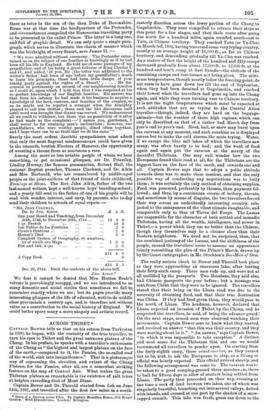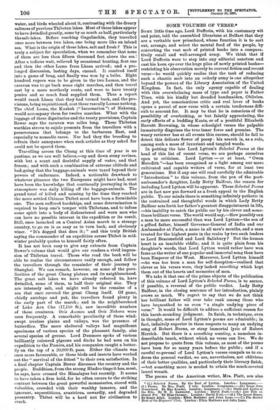ACROSS THIBET.* CAPTAIN BOWER tells us that on his return
from Turkestan in 1890, he began, with the curiosity of the true traveller, to turn his eyes to Thibet and the great unknown plateau of the Chang. In his preface, he speaks with a traveller's enthusiasm of the Chang as " the highest and largest plateau on the face of the earth,—compared to it, the Pamirs, the so-called roof of the world, sink into insignificance." That is a picturesque way of expressing the elevation and extent of the Chang Plateau, for the Pamirs, after all, are a somewhat striking feature on the map of Central Asia. What makes the great Thibetan plateau so remarkable is the existence of salt lakes at heights exceeding that of Mont Blanc.
Captain Bower and Dr. Thorold started from Leh on June 14th, 1891, and travelled after the first few miles in a south-
• Diary of a Journey across Tad. By Captain Hamilton Bower, 17th Bengal Cavalry. With Illustrations. Landon Rivington. easterly direction across the lower portion of the Chang to Gagalinchin. They were compelled to retrace their steps at this point for a few stages, and then their route after going due north for a hundred miles, again trended south-east to Yatu, in Chinese territory. They reached Yatu (or Ya-Chu) on March 3rd, 1892, having traversed some very trying country, mostly at an average height of 16,000 ft., as far as Chinese territory, and descending gradually till Ya-Chu was reached. As a matter of fact the height of the hundred and fifty camps decreased gradually from about 17,600 ft. to 12,600 ft. at the hundred and tenth camp at Sari Samdu—the altitude of the remaining camps and rest-houses not being given. The mini- mum temperatures, though mostly below the freezing-point, do not seem to have gone down low till the end of September, when they had been detained at Gagalinchin, and reached their lowest when the travellers had gone up into the Chang again, and while they were turning east to Chinese territory. It is not the night temperatures which must be expected at such attitudes that are so trying to the Central Asian traveller—though, indeed, they are hard on the baggage- animals—bat the weather of these high regions, which can only be described as that of a rather bad March day from year's end to year's end. Sleet, hail, or snow may burst upon the caravan at any moment, and such sunshine as is displayed serves but to make the cold storms the more trying. Water, if we except the blue salt lakes of which the travellers saw many, was often barely to be had; and the want of food again and again put the caravan at the mercy of the deceitful Thibetans. One may well wonder how the two Europeans found their road at all, for the Thibetans are the biggest liars on the face of the earth, and cowards one and all. Captain Bower says that to adopt a polite attitude towards them was to make them insolent, and that the only possible way of conducting any negotiations was to bully them; it was certainly the only method of obtaining supplies. Food was procured, preferably by threats, then payment fol- lowed ; and thus, by a continuous course of bribery, threats, and sometimes by means of disguise, the two travellers forced their way across an undoubtedly interesting country, sub- jected to the annoyances of the vilest climate imaginable, and comparable only to that of Tierra del Fuego. The Lamas are responsible for the character of both settled and nomadic Thibetans, having all the wealth, intelligence, and power in Thibet,—a power which they use no better than the Chinese, though they themselves may be a cleaner class than their Eastern neighbours. We need not be surprised, then, that the combined jealousy of the Lamas, and the shiftiness of the people, caused the travellers' route to assume an appearance faintly resembling the plan of the Prince's March, drawn up by the Court cartographer, in Mr. Stockton's Bee-Man of Om The really serious check to Bower and Thorold took place as they were approaching an enormous lake, after leaving their forty-sixth camp. Three men rode up, and were not at all mollified by the passports. Two Russians, they said also, had Chinese passports the year before; but a message was sent from China that they were to be ignored. The travellers stated that their being on the Lhasa road was due to the necessity of obtaining food, and that their true destination was China. If they had food given them, they would pass to the north of Lhasa. The headman, however, declared that Lhasa expected an invasion of Thibet by the Chang, and he suspected the travellers, he said, of being the advance-guard ! On the next stage, armed men were observed watching their movements. Captain Bower sent to know what they wanted, and received an answer " that this was their country, and they were moving about in it." " An answer," says Captain Bower, " to which it was impossible to take exception." A distinct and neat score for the Thibetans this, and one we would recommend all travellers to ponder upon. On starting from the forty-eighth camp, these avant-couriers, as they turned out to be, sent to ask the Europeans to stop, as a Zhung or official was hourly expected. This official arrived shortly, and the following arrangement was come to. The caravan was to be taken to a good camping.ground three marches on, there to halt for fifteen days to allow of matters being settled from Lhasa. The party then proceeded on their way, crossing at one time a neck of land between two lakes, one of which was singularly beautiful, branching out into several valleys, dotted with islands, and crossed at one part by the shadow of a snow- capped summit. This lake was fresh, grass ran down to the
water, and birds wheeled about it, contrasting with the dreary saltness of previous Thibetan lakes. Most of these lakes appear to have dwindled greatly, some by as much as half, particularly the salt-lakes. Before reaching Gagalinchin, they travelled once more between two lakes, one being more like an inland sea. What is the origin of these lakes, salt and fresh ? This is truly a subject for speculation, when we remember that none of them are less than fifteen thousand feet above the sea! After a tedious wait, relieved by occasional hunting, first one and then the other Lama from Lhasa arrived ; and a pro- longed discussion, lasting days, ensued. It resolved itself into a game of brag, and finally was won by a bribe. Eight hundred rupees was to be given to the two Lamas, and the caravan was to go back some eight marches, and then travel east by a more northerly route, and were to have twenty ponies and so much food supplied them. Thus a report would reach Lhasa that they had turned back, and the pro- visions, being requisitioned, cost these rascally Lamas nothing. The chief Lama, the Kushok (" Incarnation ") of Naksung, would accompany them for twelve marches. What with the luggage of these dignitaries and the treaty provisions, Captain Bower says the caravan was miles long. These Thibetan worthies strove to cajole presents from the travellers with a perseverance that belongs to the barbarous East, and especially to nomadic races. Nor had they the breeding to refrain their annoyance when such articles as they asked for could not be spared them.
Travelling across the Chang at this time of year is no pastime, as we can well believe,—up and down stony ravines, with but a scant and doubtful supply of water, and that frozen ; and with such a combination of extreme altitude and bad-going that the baggage-animals were taxed beyond their powers of endurance. Indeed, a noticeable drawback to whatever pleasure the two Europeans might have had, must have been the knowledge that continually journeying in that atmosphere was daily killing off the baggage-animals. The grand total of killed and missing by the time they reached the more settled Chinese Thibet must have been a formidable one. The men suffered hardships, and some determination is required to keep one's temper with Thibetans, and to infuse some spirit into a body of disheartened and worn men who can have no possible interest in the expedition or its result. Still, once launched on a Central Asian march in a strange country, to go on is as easy as to turn back, and obviously wiser. "It's dogged that does it ; " and this truly British saying the commander of an expedition across Thibet in mid- winter probably quotes to himself fairly often.
It has not been easy to give any extracts from Captain Bower's volume that would give our readers a vivid impres- sion of Thibetan travel. Those who read the book will be able to realise the circumstances easily enough, and follow the travellers through the remainder of their journey to Shanghai. We can remark, however, on some of the pecu- liarities of the great Chang plateau and its neighbourhood. The great salt lakes we have already referred to, have dwindled, some of them, to half their original size. They are intensely salt, and might well be the remains of a sea that once covered the great Chang itself. Of game, chiefly antelope and yak, the travellers found plenty in the early part of the march ; and in the neighbourhood of Lake Arc Cho (17,150 ft.), saw incredible numbers of these creatures. Ovis Ammon and Ovis Nahura were seen frequently. A remarkable peculiarity of these wind- swept treeless plains and valleys, was the presence of butterflies. The more sheltered valleys had magnificent specimens of various species of the pheasant family, also several species of grouse. Lord Dunmore spoke of various brilliantly coloured pigeons and ducks he had seen on his expedition to the Pamirs, and his companion caught a butter- fly on the top of a 20,000 ft. pass. Either the climate was once more favourable, or these birds and insects have worked out the " survival of the fittest " to their own satisfaction. In a final chapter Captain Bower discusses the country and the people. Buddhism, from the strong Hindoo tinge it has, must, he says, have crossed the Himalayas but recently. It seems to have taken a firm hold, for he often recurs to the striking contrast between the great powerful monasteries, stored with valuables, crowded with their wealthy inmates, and the ignorant, superstitious, avaricious, cowardly, and degraded peasantry. Thibet will be a hard nut for civilisation to crack.



















































 Previous page
Previous page